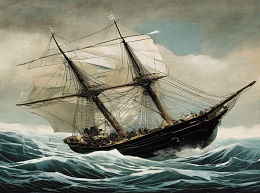Moby-Dick

"Moby-Dick" is a novel written by American author Herman Melville, first published in 1851. It is considered one of the greatest works of American literature and a classic of world literature. The novel is an epic tale that explores themes of obsession, revenge, and the complexity of the human soul. Here's a summary:
Setting:
The story is set in the early 19th century and primarily takes place on a whaling ship named the Pequod. The ship embarks on a voyage around the world, with a particular focus on hunting the elusive white whale, Moby-Dick.
Characters:
-
Ishmael: The narrator of the story, a young sailor who signs up for the whaling expedition.
-
Captain Ahab: The charismatic and obsessed captain of the Pequod, seeking revenge against the white whale that maimed him.
-
Queequeg: A Polynesian harpooner and close friend of Ishmael.
-
Starbuck: The chief mate of the Pequod, a thoughtful and moral man.
-
Stubb: The second mate of the Pequod, known for his easygoing nature.
-
Tashtego and Daggoo: Harpooners from different parts of the world, representing the diverse crew of the Pequod.
-
Moby-Dick: The great white whale that Captain Ahab is obsessed with hunting.
Plot Summary:
-
Introduction:
- Ishmael, seeking adventure and a change in life, decides to embark on a whaling expedition. He joins the crew of the Pequod, captained by the mysterious and charismatic Ahab.
-
Ahab's Obsession:
- As the voyage progresses, it becomes clear that Captain Ahab is consumed by an intense and monomaniacal obsession with Moby-Dick, the white whale that had previously maimed him.
-
Whaling Adventure:
- The novel explores the daily life and challenges of the crew as they engage in the dangerous and lucrative business of whaling. It also delves into the symbolic and metaphysical aspects of the hunt for Moby-Dick.
-
Ahab's Quest for Revenge:
- Ahab reveals his intense desire for revenge against Moby-Dick, vowing to kill the whale at any cost. His obsession with the white whale becomes a central theme.
-
Symbolism and Philosophy:
- Melville weaves in philosophical and symbolic elements, with the white whale symbolizing the mysteries of the universe, the unknowable nature of God, and the human struggle with fate.
-
Encounters with Other Ships:
- The Pequod encounters other whaling ships, each with its own unique story. These encounters contribute to the novel's exploration of themes such as camaraderie, competition, and the diversity of human experience.
-
Final Confrontation:
- The novel builds toward the final, dramatic confrontation between Captain Ahab and Moby-Dick. The outcome of this encounter is both tragic and symbolic.
-
Ishmael's Survival:
- The novel concludes with the sinking of the Pequod and the death of Captain Ahab. Ishmael is the sole survivor, left adrift on a small piece of the ship's wreckage.
-
Reflections on the Sea:
- Ishmael reflects on the nature of the sea, the impermanence of life, and the mysteries of existence. The novel ends with the famous line, "Call me Ishmael."
Themes:
-
Obsession: Ahab's obsessive pursuit of Moby-Dick is a central theme, exploring the destructive nature of unchecked passion.
-
Symbolism: The white whale symbolizes various themes, including the unknowable aspects of the universe, the struggle with fate, and the mysteries of the divine.
-
Nature and the Sea: The novel reflects on the power and unpredictability of nature, especially the vastness and mystery of the sea.
-
Diversity and Camaraderie: The crew of the Pequod represents a diverse range of cultures and backgrounds, exploring themes of camaraderie and the shared human experience.
Significance:
-
Literary Impact: "Moby-Dick" is considered one of the greatest American novels and is admired for its rich symbolism, philosophical depth, and exploration of the human condition.
-
Influence on Literature: The novel has had a profound influence on literature, inspiring subsequent generations of writers and thinkers.
-
Challenges and Rediscovery: While initially met with mixed reviews, "Moby-Dick" has since been recognized as a literary masterpiece. Its complex narrative and themes have been studied and appreciated in academic and literary circles.
-
Cultural References: The novel has left a lasting impact on popular culture, with references to characters and themes appearing in various forms of media.
"Moby-Dick" is a novel that invites readers to explore the depths of the human soul, the mysteries of the universe, and the enduring power of the sea. Its intricate narrative, rich symbolism, and philosophical reflections continue to captivate readers and contribute to its status as a classic of world literature.













